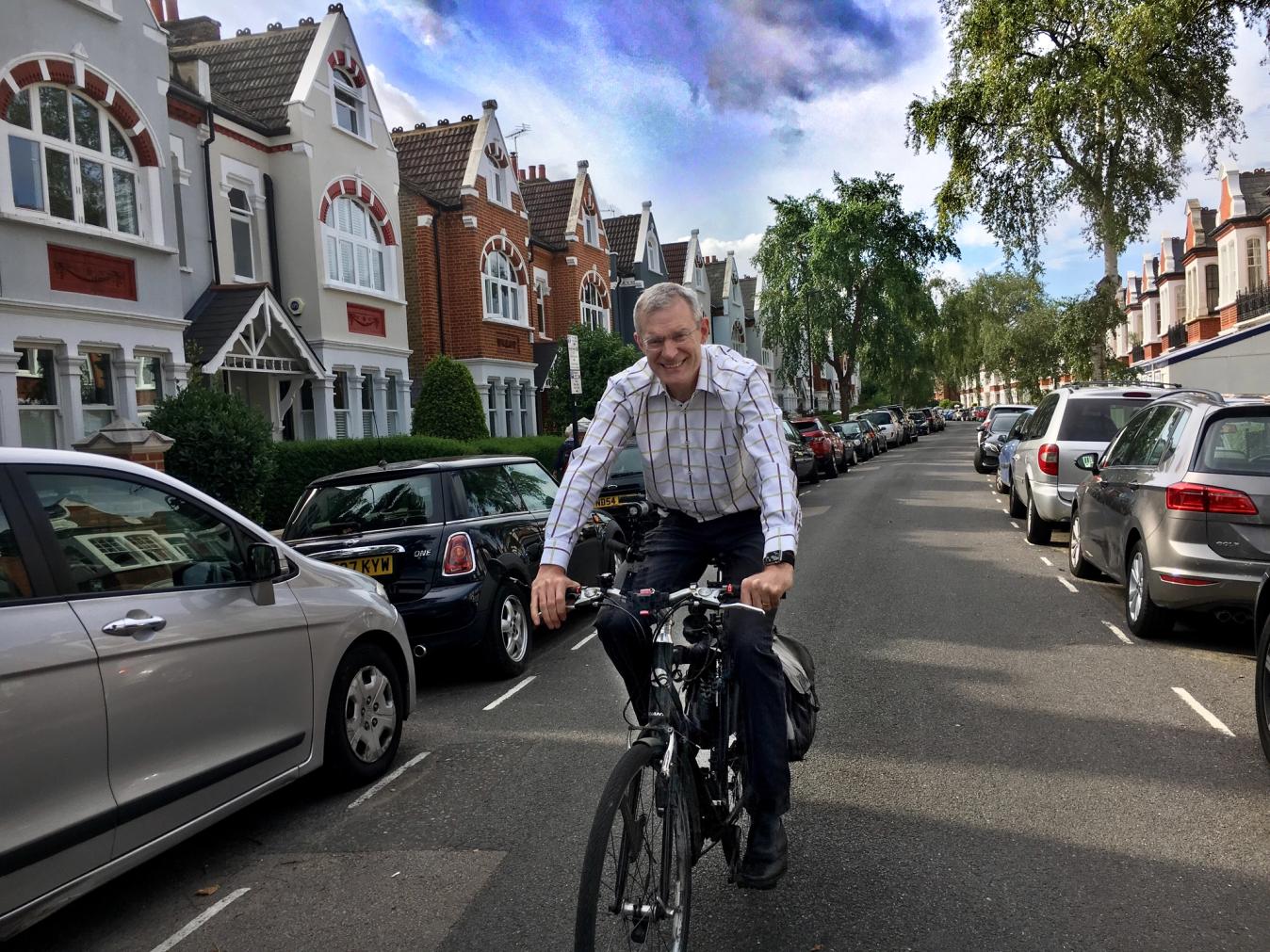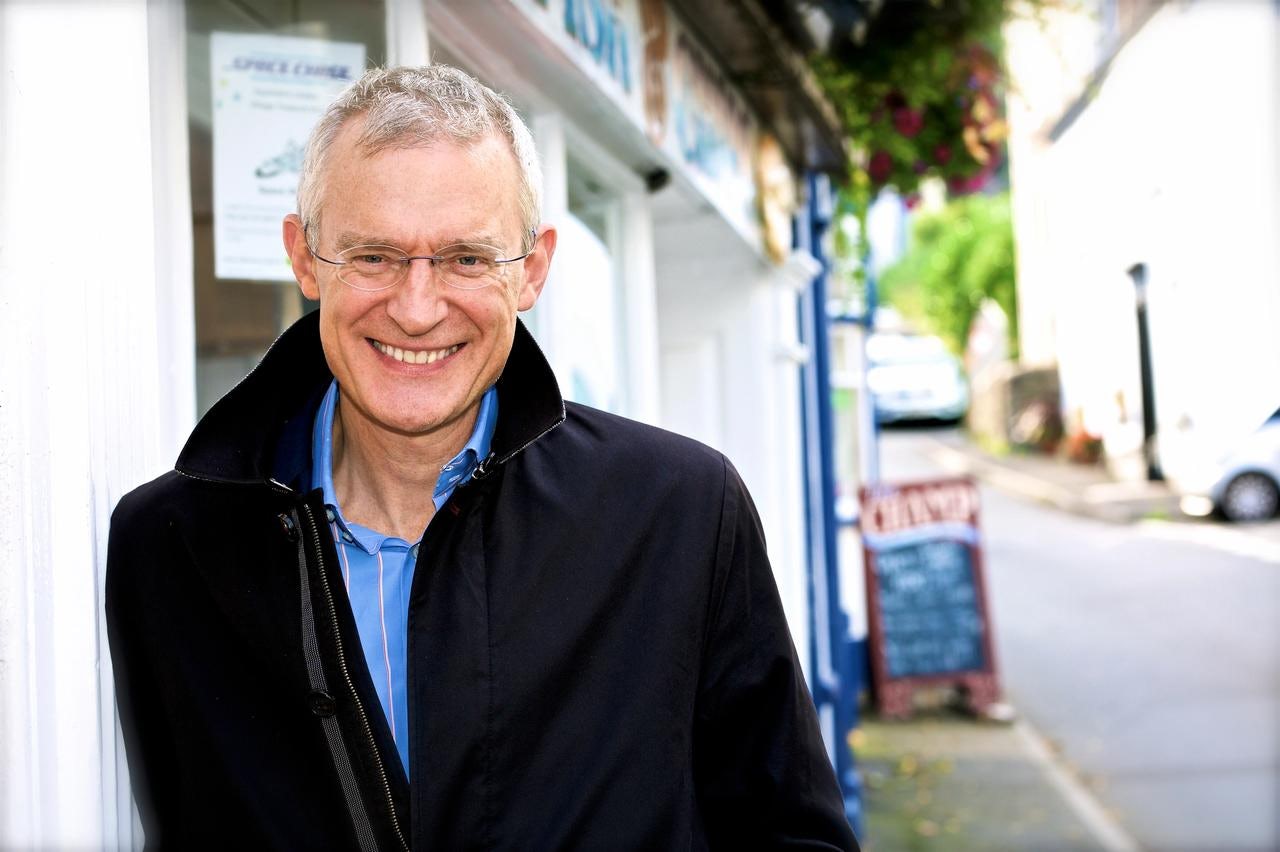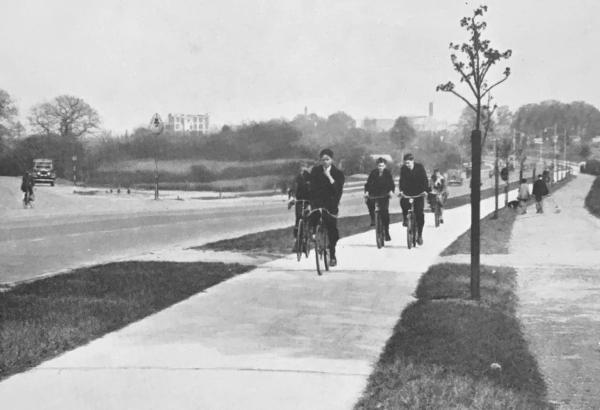Jeremy Vine interview: I just couldn’t accept that I had to risk my life to get to work
Exclusive GCN interview: Vine on his viral cycling videos, the war on the roads and 'petrosexuals'
James Howell-Jones
Junior Writer
© Jeremy Vine
Jeremy Vine
Broadcaster Jeremy Vine has been a fixture of British television and radio for over three decades. In recent years, he’s been using his influence to amplify road safety concerns in London by sharing clips from the frequent run-ins with cars that punctuate his seven-mile commute.
Vine wants to show just how dangerous a car can be, especially when a negligent or aggressive driver is behind the wheel. By naming, shaming, and reporting bad drivers he meets on the road, he believes he is making the roads safer, one driver at a time.
Vine’s videos displaying his first-hand experience of road rage, near misses and even actual collisions have amassed more than 100 million views, with each clip provoking a deluge of replies. While Vine has many supporters, the number of vicious insults and criticisms under every video is shocking. It’s a wonder how Vine bears it.
Look closer though, and you get the sense that he actually quite enjoys riling up the ‘petrosexuals’ – his favourite name for the die-hard drivers who abuse him under every clip. Given his appetite for controversy and cheeky nature, it’s not always clear where the cycle safety message ends, and where the troll-baiting begins.
In fact, some cyclists feel that by stirring up hatred, Vine is doing more harm than good. They worry that by sharing only the most bitter exchanges between cars and bikes, ‘helmet cam cyclists’ like Vine are creating a chasm between drivers and cyclists that will lead to more animosity, more aggression, and quite possibly, more casualties.
To hear his view on the matter, GCN spoke to Vine exclusively via a video call.

© Jeremy Vine
Jeremy Vine cycling in London
Taking up cycling
“I started cycling when I was in my early forties,” Vine told GCN, “because basically, I was starting to be a bit porky, really. I was putting on weight; I was having a bit of a midlife crisis; I was miserable.
"I joined a gym, but I only got to the gym once in the first year, which meant that having one jacuzzi cost me £500. I decided to try and build fitness into my routine and I thought, ‘I've got to start commuting on my bicycle.’”
The lifestyle change suited Vine well, but there was one thing that could never sit right with him.
“I just couldn't accept the fact that I had to risk my life to get to work. I still find it outrageous – you can see me colouring up as I say this, I'm getting cross even just sitting here.”
It was that frustration that first inspired him to mount a camera to his bike and record his commute way back in 2012. Since then, he has recorded and published hundreds of clips. It’s a labour of love for Vine, who takes pleasure in the process.
“The technology is really amazing, and I quite enjoy the business of filming the journey and then showing it online.”
Improving road safety
Vine is one of a growing number of people filming, sharing and reporting his run-ins with bad drivers. Some, like Vine’s friend Cycling Mikey, head out on their bikes in search of drivers to report. Others, like Vine, are “more incidental about it”. Either way, he believes that collectively, helmet-cam cyclists are making the roads safer: “I think some of the lower league offending in London has got better, actually.”
“What I’ve noticed as I go down past the line of traffic is that a lot of drivers now sit when they're stationary with their hands in their lap. It's almost as if they're practising being law-abiding.”
Asked whether naming and shaming bad drivers is effective, Vine’s answer is unequivocal:
“Yes. I think that enforcement and that includes social media enforcement, is the only way it works. When I started cycling, I didn't want to do any of this. I just thought I'm going to have a Kumbaya approach here. I'm going to just drift around, wave everybody on, smile, wave, thank them.
“And I suddenly realised there are drivers out there who want to kill people. I think that's the only explanation for how badly they drive.”
Vine acknowledges that road design has a major role in this too.
“The two things that are bad are inadequate roads and poor drivers, and when they come together, they're lethal.
“We've got to change the roads, and that means more inbuilt protection for cyclists,” he says.
Really though, roads are only dangerous, says Vine, because they are filled with dangerous, law-breaking drivers.
“When COVID was on, some mornings, I didn't see a single car, and the strange thing was, the roads were safe. So we've got to think carefully here. Even the dangerous roads were safe during COVID. Why was that? Because they're not dangerous until the driver appears.”
Vine still drives, but only 150 miles a year. Having observed the traits that it brings out in him, and the danger he poses to others, he’s lost confidence at the wheel.
“When I used to drive a lot, God, I was a terrible driver. You could see what it does. It puts you in a race, and the attitude is, ‘I've got to be there first, I must get in front’. And that's not safe, it just isn't safe.”
Now, he’s seen enough aggression, arrogance and laziness from drivers that he’s totally given up hope of connecting with drivers through kindness and encouragement.
“I'm sorry, I think in the end, the Kumbaya approach didn't really work. I wish we could all be happy and ‘share the road…’
“Unfortunately it's only fining and punishing bad drivers that works; you can't encourage bad drivers, it just makes it worse.”
Warring factions
Having given up on his ‘Kumbaya approach’, Vine has declared war on bad drivers. His medium of choice is X, formerly Twitter, where he’s developed a real knack for riling up the ‘petrosexuals’ who, bizarrely, tend to follow him.
“You often hear ‘you are an absolute c**t’ or something, and I'll look at the guy's profile and, sure enough, he follows [me]. And I'm thinking, 'he's only following me because he wants to berate me like that, with that horrible language.'”
To some extent, Vine bemoans the negativity that Elon Musk’s social network feeds off. Vine believes his videos are being placed into the feeds of people who are “algorithmed as cycle haters.”
“I think Elon Musk has decided that the best form of interaction is disagreement, and now, when I upload a cycle video, I will get responses from some guy who's a farmer in Alaska, who will say, ‘what the hell is this shit on my timeline?’”
As a result, says Vine, “Twitter’s got particularly vicious if you’re not a driver.”
“And my wife said, ‘Oh just come off it’. But actually, I did the opposite. I decided to engage with it more assertively, to upload more videos, and to do more…I would think of it as education so that drivers can see the world from the perspective of a cyclist.”
“Has it worked?” he asks rhetorically. “I don't know. All I want is for fewer cyclists to die on the roads. That's it.”
Vine wades into the swamp of hatred on X (Twitter) each day, taking time to reply to the very cruellest of insults personally. For most of us, exposure to so much negativity would be crushing. For Vine, it’s water off a duck’s back.
“It doesn’t matter to me at all,” he says easily. In fact, it seems he quietly enjoys rubbing motorists up the wrong way:
“The angrier people get, the better.”
He toys with his trolls, whom he characterises as “men in pants,” by deploying well-chosen memes and dishing out witty put-downs. He even expresses wild opinions knowing they will rush to tear him down.
“I did one the other day – you'll laugh – I was on my penny farthing, and went down the Chiswick High Road, and there's a road sign for Brackley Road, which is a little bit low if you're on a penny farthing – I'm nine foot up in the air, right?
“So as I go underneath it, I duck, and I then upload this film, and I knew this would happen, and I say, ‘there needs to be more attention given to the height of road signs now that penny farthings are becoming more popular’.
“Oh my God, the abuse I got for that! Because no one could take a joke!”
Throughout his career as a broadcaster and journalist, Vine has always been able to identify and focus on those topics that people really care about to get the conversation started. His radio and television programmes are hotbeds of debate, as Vine brings people together to disagree on whatever the most contentious issue of the day is. We asked him whether he relishes the furor his cycling videos create.
“No, I think it's very different. In my professional work, I'm very much the referee in these discussions, so I'm impartial, and I genuinely am – if you said to me, ‘how do you vote?’ I don't think I could even answer that.
“This is different. This is the one area where I don't really think I can claim to be impartial at all. I don't think road death is a good idea in anyone's book. So it's very different from my show.”
The link between the culture war and the war on the roads
Some worry that by stoking online hatred and feeding the ‘cars versus bikes’ feud, Vine is actually making the roads less safe. They argue that by dividing the discourse into black-and-white boundaries – ‘cyclists’ versus ‘driver’ – Vine and his fellow cycle safety advocates are stirring up a culture war that could easily spill onto the roads in the form of aggression towards cyclists.
This is an accusation that Vine flatly rejects.
“No, don't load it on me,” he insists. “Me, Cycling Mikey, many others now film and upload and say, ‘this has got to stop’. This is not the fault of the people who end up being hit by the drivers. And if the drivers can't control themselves to the point where they become more dangerous because of something they've seen on Twitter (X), they shouldn't have a licence in the first place.
“So listening to you talking, I'm thinking maybe if I just did no Tweeting of any cycle videos, all those angry people would calm down, and the answer is, no, they'd quieten down, they wouldn't have an outlet, and they'd take it out when they get in their car next time they see a vulnerable road user. And I'm afraid, and I come back to this point, the only thing bad drivers understand is enforcement.”
Among experienced cyclists, the acts of road rage, close passes and general negligence from drivers are almost taken as a given, much like punctures.
Having only started cycling when in his 40s, Jeremy Vine has brought fresh eyes to the issue, and he’s refused to simply say c'est la vie and get on with it. With a conviction that most of us would be incapable of, he’s taken the issue into his own hands, and now, he believes he is having a direct impact on road safety in London.
Online, he’s combative. Nevertheless, by engaging with the rage-filled motorists, he reveals the deep-seated hatred and aggression brewing within so many people. It’s by drawing the rage of ‘petrosexuals’ to the surface that Vine evidences his case that “the only thing bad drivers understand is enforcement”.
We all want to take what Vine calls the ‘Kumbaya’ approach and think the best of people, but Vine argues that there are drivers out there who have a pathological hatred of cyclists and a complete disregard for safety. To fix that, says Vine, we need to enforce the rules of the road, and we need to design our roads to protect cyclists. Vine's methods might ruffle feathers, but ultimately, he's doing what most cyclists are not: taking direct action to make the roads safer.










